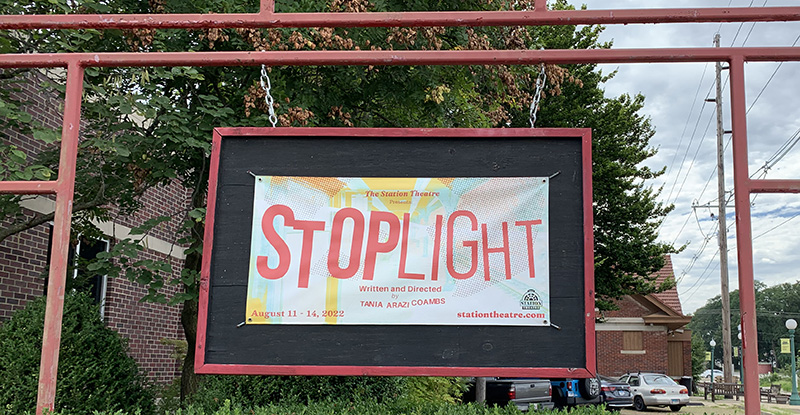After sharing a teaser for Tania Arazi Coambs’ Stoplight in my list of five things in arts for the month of August, I decided I needed to learn more about the play and the woman who created it. Coambs agreed to meet me at the Station Theatre, where this original three-act play will premiere on August 11. I was first greeted by the production’s stage manager, Isabel Curtis, who was off to meet with the crew about the sets. Teri Sturdyvin, who plays the character Emilia, was on hand to help paint. Coambs joined us moments later, as warm and kind as she is accomplished.
Tania Arazi Coambs, who recently received her DMA in Vocal Performance and Literature with a concentration in Stage Direction from the University of Illinois, is also the winner of the 2018-2020 National Opera Association’s Outstanding Dissertation Award. Her bio on the NOA website describes Coambs as follows.
“With diverse musical interests in opera, musical theatre, jazz, and art song, Tania Arazi Coambs is a passionate and versatile performer, stage director, scholar, and writer. Recognized for her ‘searing and intense acting and singing,’ Tania made her début at Chicago Symphony Orchestra Hall as the winner of the American Prize Chicago Music Theater Award.”
Redefining America Through Opera: Representations of Latin/o Americans and a New Representation is more than research for Coambs. Born in Venezuela, and descended from Sephardic Jews forced out of Egypt, issues of representation are close to her heart, both on and off the stage.
As we sat in the lobby Coambs shared that she “thinks she has always been a writer and singer. I just love being in theatrical space trying to tell stories.” The promotional information I’d read about Stoplight had offered up three facts I wanted to investigate. The play had been developed during the pandemic and over a series of Zoom meetings with local actors. There were over a dozen characters whose stories were somehow interconnected. The primary storyline focused on twin sisters who suffered from asthma.
With her plans for performing on hold during the early part of the pandemic, Coambs decided to focus on writing. Originally intending to create a one-act play with three or four actors, Coambs’ various calls yielded an abundance of volunteers, an eventually a full-length play. Coambs describes their first meeting as follows.
“I started with the question ‘what kind of characters would you like to be?’ ‘What kind of stories would you like to tell?’ And I went around and I asked people, you know, what are things that you would like to do? So for my teenage contingency, who were all young African American teens, [they said] ‘We want to play teenagers…we really want to play stuff that’s age appropriate. ‘They wanted to also talk about some issues about race, but not overtly. One of the things that came up with all of the teams that came on that day, they were talking about mother figures.” Another guy who was in his mid to late 20s, and who grew up in a small town said, W’ell, in my small town, ideas of what it is to be a man or so from back in the 50s, you know, getting in touch with your motions, is not something that I’ve been able to do until after I moved out from my community. And I got a little older, he said, [and started] thinking about my mental health and, dealing with some issues.”

Photo by Debra Domal.
The collaborative process Coambs described comes from a tradition called devised theatre. It requires active listening and flexibility on the part of the playwright. It also opens the door for new voices and stories and for true representation. From what Coambs describes, weaving together all of these pieces into a cohesive narrative is challenging, but well worth it.
After hearing from the entire group, Coambs went on to ask everyone to share something about their lives. As Coambs tells it, one actor who was in his mid to late 20s, and who grew up in a small town said, “Well, in my small town, ideas of what it is to be a man or so from back in the 50s, you know, getting in touch with your motions, is not something that I’ve been able to do until after I moved out from my community. And I got a little older, he said, [and started] thinking about my mental health and, dealing with some issues.”
Another thing that came up that day was “one of the teenagers that came, mentioned that she had really severe asthma, and she said one time, she was going home from school, and had to have a friend help her because she forgot her asthma medication.” This later became a key focal point in the play. As Coambs began to develop the dialogue for the sisters, her approach allowed them to work with her to find the best language to tell the story. Language that felt like something they would say. This is how true representation happens.
I told Coambs that when I first read that two characters in the play struggled with asthma, it struck me as the perfect metaphor for the multiple pandemics that surfaced over the last few years. The pandemic-level respiratory disease being just one thread. Asthma, as Coambs reminds me, disproportionally impacts the Black population. And then, of course, there were the horrific murders of Black men by white police who literally robbed them of breath. Coambs and I both found ourselves saying the words “I can’t breathe.”
Coambs is excited to be working with several young actors from the Station’s recent workshops for teens of color. She is pleased to see its commitment to inclusion and diversity made manifest in bringing new people in community theatre and centering voices and perspectives that were previously underrepresented. She is also grateful to the Station for providing a home for Spotlight to develop and grow.
The subject matter is intense and the scope is ambitious. Coambs and her cast and crew still had much to do before the curtain rises on opening night. Creating a play in the devised theatre tradition, particularly one with so many characters (and sets) requires Coambs and Curtis to think like puzzle masters. And they clearly do.
Stoplight will be the Station Theatre’s first full-length production of an original work. And they couldn’t have found a more apt story or a more worthy group of co-creators. This writer is happy to see the Station function as an creative incubator. Let’s do our part to keep it going. Fill the seats. Share your feedback and help take Stoplight to the next stop on its journey.
Stoplight
August 11-13, 7:30 p.m.
August 14, 3 p.m.
The Celebration Company at the Station Theatre
223 N Broadway Ave
Urbana
Get ticket information here.








